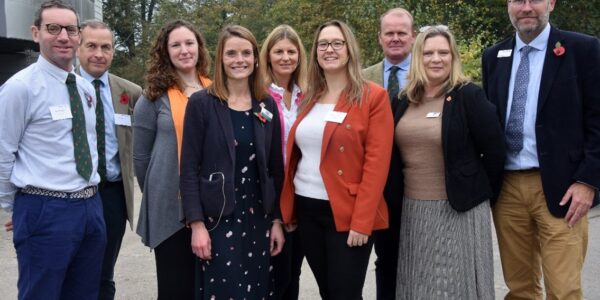Rare wild plants thriving amid bustle of busy Suffolk industrial site
3/02/2021 - Plantlife

Painstaking conservation work by Plantlife botanists, partners and volunteers to turn around the fortunes of Field wormwood, one of England’s rarest and most threatened wild plants, has delivered fantastic results at London Road Industrial Estate, one of the tiniest nature reserves in England.
To save and protect Field wormwood (Artemisia campestris), conservationists from the Back from the Brink Shifting Sands project removed turf and vegetation to create bare, disturbed ground the plants require. Populations of the plant have been monitored closely for years by the Breckland Flora Group, a band of energetic volunteer botanists co-ordinated by Plantlife.
The results have been astounding: a count of Field wormwood in the tiny nature reserve within the industrial estate has shown a massive increase in numbers with a count of 85 flowering plants and 303 non-flowering plants, up from just 2 flowering plants and 100 non-flowering plants in 2019.
Field wormwood has found safe harbour at London Road in flora-rich Breckland as the estate offers its particular preferred conditions: infertile soil that is low in nutrients, sandy and disturbed, where more competitive plants that thrive on enriched soils, such as docks and nettles, are unable to get a foothold. The hustle and bustle of the estate benefits Field wormwood as the plant does not tolerate being grazed and the activity largely keeps deer and rabbits away.
The cheering results are not limited to the designated site; Field wormwood plants are now also flowering on the road verges around the Estate. As part of their new status as a County Wildlife Site, the verges are now being cut just once a year to give these rare plants a chance to flower and seed. As a result, 150 more plants were counted on verges this year than last. That these plants are being allowed to seed is critical for the survival prospects for the extremely rare Wormwood moonshiner, a beetle that feeds on the seeds of Field wormwood at night.
Many sites of Field wormwood have been lost to building development, intensification of agriculture or forestry in recent decades to the point that it is now extant at only three native sites in the country – all within Breckland.
Plantlife’s Johanna Jones, Co-ordinator, Breckland Flora Group, commented:
“London Road Industrial Estate, one of the tiniest nature reserves in the country, is an incredibly special place for plant life, but we have come to realise that we must do more to better manage the road verges close to the site. I am so excited that in just a year there has been such an increase in the number of flowering plants both in the reserve and the verges and of the beetles that feed on them. It is great to have the support of many of the unit owners and tenants.”
Cllr John Griffiths, Leader of West Suffolk Council, said:
“We are pleased to support this project in Brandon as another example of how we are working with partners to increase biodiversity and help the environment. We have adapted our grass cutting routine in various areas across the district and it’s great to hear that in Brandon, it is already having such a positive impact.”
Tessa Greaves, a Breckland Flora Group recorder who has been visiting the Estate for the last ten years, said that when she saw a group of bushy Field wormwood plants, “My heart skipped a beat! This is the first time in ten years that I have seen these plants flowering and the uplifting sight made all the volunteering feel so worthwhile!”
Plantlife and partners have released national road verge management guidelines that highlight the huge benefits to wildlife that cutting verges less and later can deliver.
To find out lots more information and how you can get involved visit the Plantlife website
All articles on this news site are submitted by registered contributors of SuffolkWire. Find out how to subscribe and submit your stories here »

